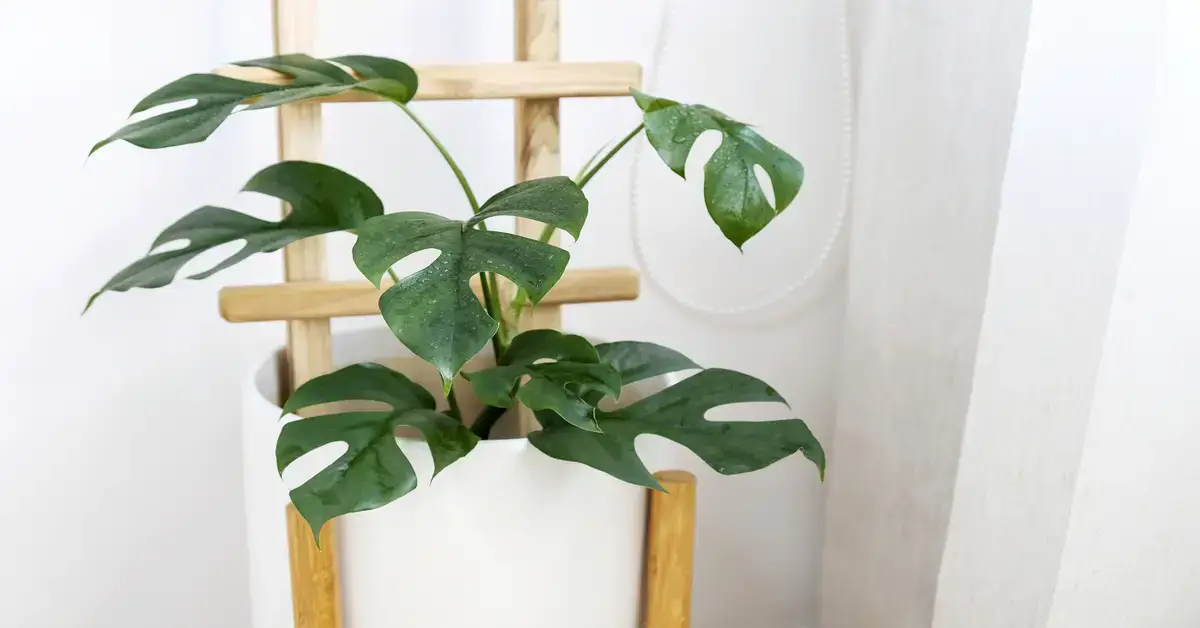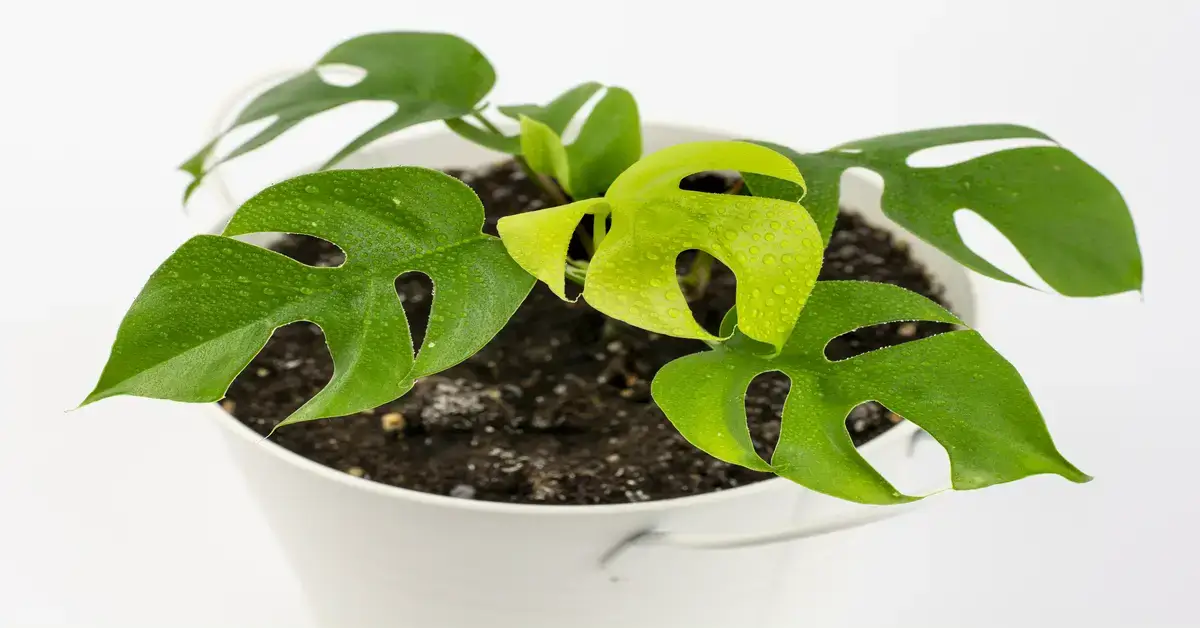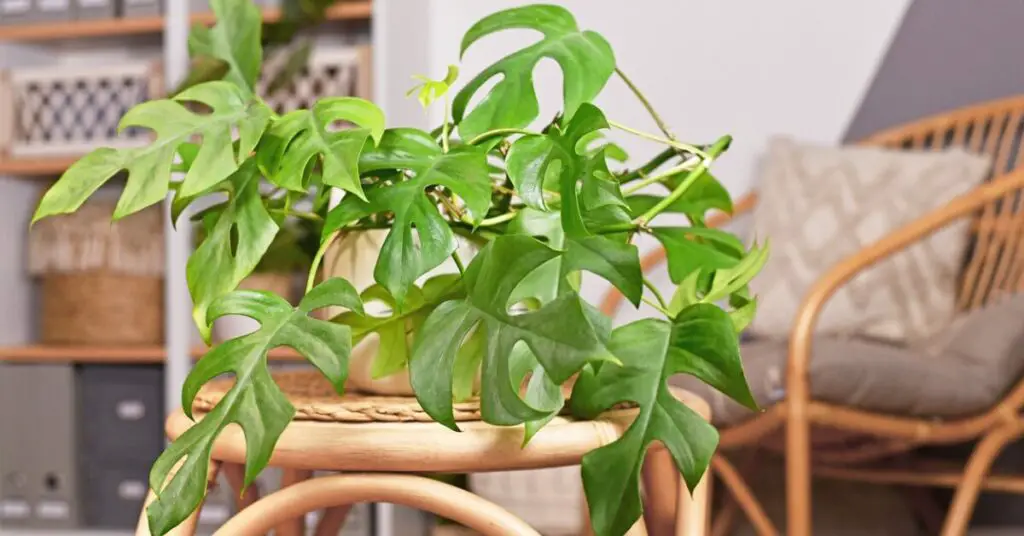Meet Monstera Minima, commonly known as Rhaphidophora Tetrasperma, a favorite among indoor gardening enthusiasts. Known for its unique split leaves and manageable growth, this ‘Mini Monstera’ is ideal for adding a tropical flair to indoor spaces. For a comprehensive overview of the Monstera Minima, including its characteristics and care requirements, you can refer to this NC State backed database.
This guide will cover essential care tips for Monstera Minima, from proper lighting to watering techniques. Our goal is to provide you with straightforward, practical advice to ensure your plant thrives, enhancing the beauty of your home.
Understanding Monstera Minima

Origin and Natural Habitat
Monstera Minima, scientifically Rhaphidophora Tetrasperma, originates from the tropical rainforests of Southeast Asia. This plant enjoys a warm, humid environment in its natural habitat, thriving under the canopy of larger trees. This background is critical to understanding its care needs, as replicating these conditions as closely as possible will lead to a healthier plant.
Key Characteristics and Identification
At first glance, Monstera Minima might remind you of the more commonly known Monstera Deliciosa due to its fenestrated leaves. However, it’s a distinct species with its unique features. The leaves are smaller and more compact, making it an ideal plant for smaller spaces or apartments. Its leaves are heart-shaped with distinct split patterns, a characteristic that develops as the plant matures. The vining nature of Monstera Minima allows it to climb, making it a versatile addition to your indoor garden, whether you let it trail from a hanging pot or guide it along a trellis.
Essential Care Tips

Ideal Lighting and Placement
Monstera Minima flourishes in bright, indirect light. Direct sunlight can scorch its leaves, while too little light stunts its growth and leaf development. A spot near an east or west-facing window, where the sunlight is filtered through curtains, is ideal. If natural light is limited, consider using grow lights to supplement. Additionally, rotating the plant occasionally ensures even growth on all sides. To supplement natural light, especially during shorter days, consider using a grow light like this, which has been praised for helping indoor plants thrive during fall and winter.
Watering Requirements and Techniques
Watering is crucial yet often tricky. Monstera Minima prefers its soil to be consistently moist but not soggy. The best practice is to water when the top inch of soil feels dry to the touch. Reduce watering in the cooler months when the plant’s growth slows down. Over-watering can lead to root rot, so ensure your pot has good drainage.
Optimal Soil and Repotting Tips
A well-draining potting mix is vital. Consider a mixture of regular potting soil, peat moss, and perlite to provide the necessary drainage and aeration. Repotting every couple of years or when the roots start to overcrowd is recommended. Choose a pot slightly larger than the current one to allow for growth. Incorporating a high-quality potting mix like this one, can provide essential nutrients and promote healthy root development.
Temperature and Humidity Preferences
Monstera Minima enjoys a warm and humid environment, similar to its tropical origins. Aim to keep the temperature around 65-85°F (18-29°C). It can tolerate lower temperatures but not frost. Humidity is equally important; if your home is dry, consider using a humidifier or placing a water tray near the plant to increase moisture in the air.
Growth and Development
Understanding Growth Patterns
Monstera Minima is known for its fast-growing and vining nature. It can exhibit rapid growth in ideal conditions, especially during the warmer months. This plant can grow several feet in a single season, making it an excellent choice for those who enjoy watching quick progress in their plants. Its climbing habit means it can be trained to grow upwards on moss poles or trellises, adding a dynamic vertical element to your indoor garden.
Pruning and Maintaining Size
Regular pruning is essential for controlling the size and shape of your Monstera Minima. It keeps the plant manageable and encourages more lush, bushy growth. Use clean, sharp scissors or pruning shears to cut just above a leaf node. This practice also helps remove any yellow or damaged leaves, ensuring the plant’s energy is directed towards healthy growth.
Seasonal Changes and Care Adjustments
As the seasons change, so should your care routine. Monstera Minima is in its active growth phase during the spring and summer, requiring more water and fertilizer. However, in the fall and winter, its growth slows down, necessitating a reduction in watering and ceasing fertilization. This seasonal adjustment is crucial for preventing stress and maintaining your plant’s health throughout the year.
Propagation Methods
Step-by-Step Guide on Propagation
Propagating Monstera Minima is a rewarding way to create new plants from your existing ones. It’s best done in spring or early summer when the plant is actively growing. Here’s how to do it:
- Select a Healthy Stem: Look for a stem with at least one node (a small bump or blemish on the stem) and a couple of leaves.
- Make the Cut: Cut just below the node using clean, sharp scissors or pruning shears. Ensure there are at least 2-3 inches of stem.
- Rooting Process: You can root the cutting in water or directly in soil. Place the cutting in a jar of water for water rooting, ensuring the node is submerged. Change the water every few days. Plant the cutting in a pot with well-draining soil for soil rooting, keeping the soil moist but not soggy.
- Transplanting: Once the roots are a few inches long in the water, or you notice growth in the soil, transplant the cutting into a permanent pot.
Tips for Successful Rooting and Transplanting
- Ensure the cutting receives bright, indirect light during the rooting process.
- If rooting in the soil, cover the pot with a plastic bag to create a humid environment, which encourages root growth.
- Be patient, as rooting can take several weeks.
- After transplanting, care for the new plant as you would the parent plant, adapting to its individual growth.
Propagation multiplies your Monstera Minima collection and allows you to share this delightful plant with friends and family. With patience and care, you can successfully propagate and enjoy the growth of new plants.
Special Care and Advanced Tips
Fertilization and Nutritional Needs
Monstera Minima, being a fast grower during its active season, benefits from regular fertilization. Use a balanced, water-soluble fertilizer every 4-6 weeks during spring and summer. Following the recommended dosage is essential to avoid over-fertilization, which can damage the roots and leaves. During fall and winter, when growth slows, reduce or stop fertilizing until the growing season resumes.
Uncommon Care Tips for Expert Gardeners
- Leaf Cleaning: Gently wipe the leaves with a damp cloth periodically. This keeps the plant looking attractive and ensures the leaves can efficiently photosynthesize.
- Climbing Support: As a vining plant, Monstera Minima loves to climb. Providing a moss pole or trellis encourages natural growth and can lead to more significant leaf development.
- Root Pruning: To manage the size without repotting, consider root pruning. This involves carefully removing the plant from its pot, trimming the roots, and replanting it in the same pot with fresh soil.
- Layering for Fullness: Encourage a fuller look by layering. When you prune long vines, you can reposition them in the soil near the base of the plant, where they can root and grow, creating a denser appearance.
- Hydroponic Growth: For a challenge, try growing Monstera Minima hydroponically. This soil-free method can lead to impressive growth and is a unique way to display the plant.
By incorporating these advanced care tips, you can further enhance the health and appearance of your Monstera Minima, making it a stunning centerpiece in your indoor garden. Whether you’re an experienced gardener or just looking to expand your plant care skills, these tips will help take your Monstera Minima to the next level.
Conclusion
The Mini Monstera, or Monstera Minima, stands out as a unique and delightful houseplant, offering a tropical charm to any indoor space. While it shares some characteristics with larger Monsteras and Philodendrons, its distinct care needs and charming appearance make it a rewarding addition for plant enthusiasts.
As you nurture this plant, its growth and development reflect your care, enriching your home and connecting you with the natural world. Whether you’re a seasoned gardener or a beginner, the journey with the Mini Monstera will surely be a fulfilling and transformative experience for you and your living space.

